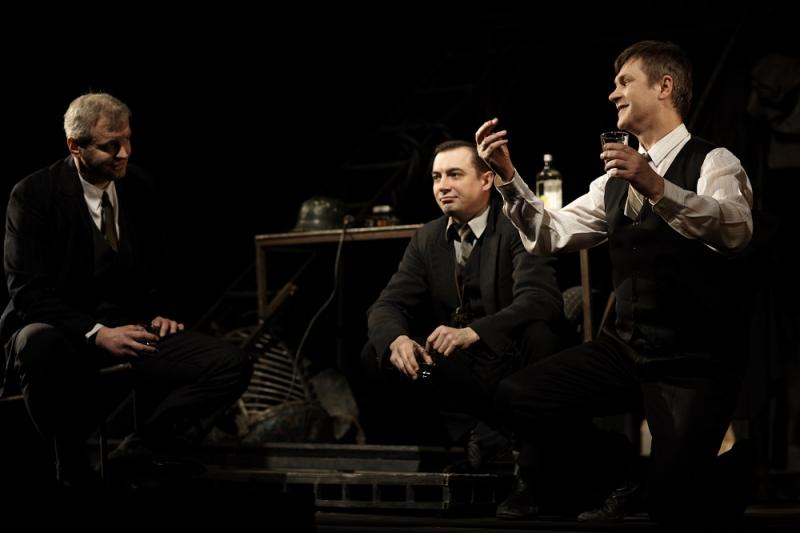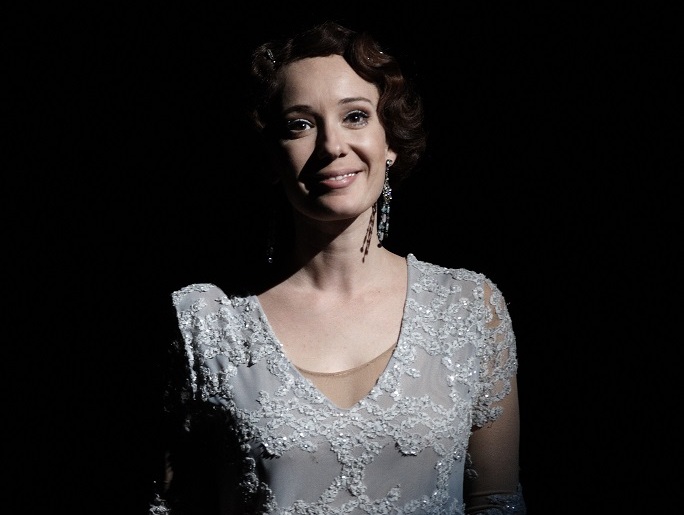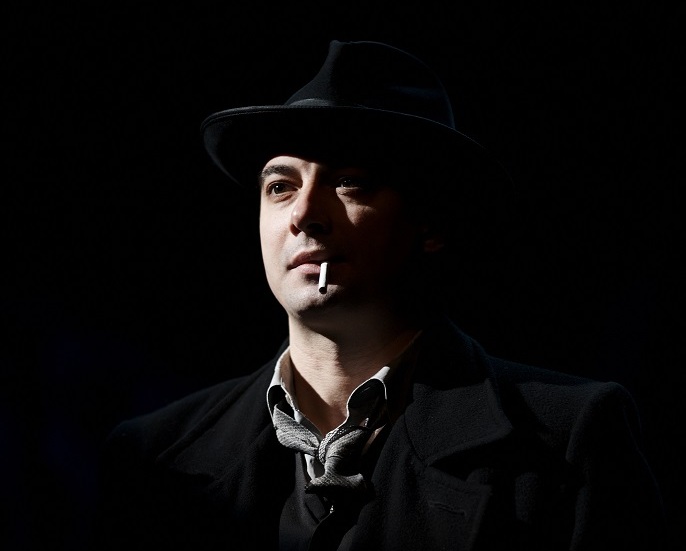Three Comrades, Sovremennik review - well-oiled Russian take on 1920s Berlin | reviews, news & interviews
Three Comrades, Sovremennik review - well-oiled Russian take on 1920s Berlin
Three Comrades, Sovremennik review - well-oiled Russian take on 1920s Berlin
Classic Moscow adaptation of Erich Maria Remarque's no-hope novel

Time runs on different lines in Russian theatre to our own. The 83-year-old Galina Volchek co-founded Moscow's Sovremennik Theatre in 1956, and has been its artistic director for the past 45 years; Three Comrades has held its place in the Sovremennik repertoire since 1999.
Our three comrades/Kamaraden/tovarischi are no communists – as they’re taken to be in a late scene here – but buddies bonded through suffering in the First World War and barely living as car mechanics in the Berlin of the late 1920s. Erich Maria “All Quiet on the Western Front” Remarque looked back in anger during his exile from Nazi Germany in the late 1930s; his novel became a successful Hollywood movie starring Margaret Sullavan and Robert Taylor. For essentially this is a love story between a frail girl and a penniless young man: think Murger’s Scenes de la vie de bohème a century on where the “students” are instead no-hopers with their futures taken away from them.

It’s easy to see why the novel was adapted for the stage by Volchek and Alexander Getman. There's not exactly an abundance of 1930s Russian drama looking back on the previous decade with honesty, and on this company residency in the Piccadilly Theatre the play should make a neat companion piece with the dashed hopes of Chekhov’s Three Sisters. There’s no attempt to shoehorn the book into a well-made play; countless short scenes are used to set up the mood and characters – established with admirable swiftness in the first ten minutes – with designer Pavel Parkhomenko’s appropriately shabby bits of set moved around as nimbly as if they were painted flats and Damir Ismagilov's lighting adding immensely to the atmosphere, a lesson in effective stagecraft. The sound collage, though its basis is dated-sounding synthesized music, assists the moodiness, too, until an ear-splitting ending which is the only obvious concession to new Russian vulgarity.
Ultimately, though, it’s all about the doomed romance between Remarque’s Rudolphe and Mimi, Robert Lohkamp and Pat Hollmann; no Chekhovian even distribution among the three supposedly main characters here. On the first night we were lucky to get one of Russia’s top actors, Chulpan Khamatova (pictured above), as the consumptive heroine, with her kittenish tones matched to a lithe physicality and charismatic beauty. Alexander Khovansky brings a not always appropriate vocal lugubriousness to her bottle-addicted, confused suitor. Still, they make a good pair, and when the pointedly cluttered set clears at the beginning of the second half to briefly replace the city with the seaside, the idyll is charming and Remarque’s mostly prosaic text hits a poetic streak.

Khovansky (pictured above) is about a decade too old for the part now; so are his fellow comrades played by Sergey Girin and a disconcertingly hoarse-voiced Sergey Yushkevich. Age does matter here: the younger the actors, the more sympathy we feel for potential nipped in the bud. The ensemble, though, is undeniably impressive; a 37 strong cast moves around the stage as naturally and convincingly as the pieces of scenery. It’s a shame that the music-drenched sentimentality, bitter-sweet in a scene filled with Robert’s beloved prostitutes, finally explodes in a bathetic apotheosis. The smartphone-wielding Russians in the audience (my neighbours among them) seemed to love it. If you want the best fictionalised depiction of Berlin in 1928, stay at home with the 14 episodes of Fassbinder’s Berlin Alexanderplatz. But if you’re fascinated by how a fine Russian company handles the German picaresque, this is worth a shot. Hopefully the supertitles, a real handful moving at rapid speed, will hold out better than they did last night, but otherwise the production serves the Volchek ethos very well indeed.
rating
Explore topics
Share this article
The future of Arts Journalism
You can stop theartsdesk.com closing!
We urgently need financing to survive. Our fundraising drive has thus far raised £49,000 but we need to reach £100,000 or we will be forced to close. Please contribute here: https://gofund.me/c3f6033d
And if you can forward this information to anyone who might assist, we’d be grateful.

Subscribe to theartsdesk.com
Thank you for continuing to read our work on theartsdesk.com. For unlimited access to every article in its entirety, including our archive of more than 15,000 pieces, we're asking for £5 per month or £40 per year. We feel it's a very good deal, and hope you do too.
To take a subscription now simply click here.
And if you're looking for that extra gift for a friend or family member, why not treat them to a theartsdesk.com gift subscription?
more Theatre
 The Maids, Donmar Warehouse review - vibrant cast lost in a spectacular-looking fever dream
Kip Williams revises Genet, with little gained in the update except eye-popping visuals
The Maids, Donmar Warehouse review - vibrant cast lost in a spectacular-looking fever dream
Kip Williams revises Genet, with little gained in the update except eye-popping visuals
 Ragdoll, Jermyn Street Theatre review - compelling and emotionally truthful
Katherine Moar returns with a Patty Hearst-inspired follow up to her debut hit 'Farm Hall'
Ragdoll, Jermyn Street Theatre review - compelling and emotionally truthful
Katherine Moar returns with a Patty Hearst-inspired follow up to her debut hit 'Farm Hall'
 Troilus and Cressida, Globe Theatre review - a 'problem play' with added problems
Raucous and carnivalesque, but also ugly and incomprehensible
Troilus and Cressida, Globe Theatre review - a 'problem play' with added problems
Raucous and carnivalesque, but also ugly and incomprehensible
 Clarkston, Trafalgar Theatre review - two lads on a road to nowhere
Netflix star, Joe Locke, is the selling point of a production that needs one
Clarkston, Trafalgar Theatre review - two lads on a road to nowhere
Netflix star, Joe Locke, is the selling point of a production that needs one
 Ghost Stories, Peacock Theatre review - spirited staging but short on scares
Impressive spectacle saves an ageing show in an unsuitable venue
Ghost Stories, Peacock Theatre review - spirited staging but short on scares
Impressive spectacle saves an ageing show in an unsuitable venue
 Hamlet, National Theatre review - turning tragedy to comedy is no joke
Hiran Abeyeskera’s childlike prince falls flat in a mixed production
Hamlet, National Theatre review - turning tragedy to comedy is no joke
Hiran Abeyeskera’s childlike prince falls flat in a mixed production
 Rohtko, Barbican review - postmodern meditation on fake and authentic art is less than the sum of its parts
Łukasz Twarkowski's production dazzles without illuminating
Rohtko, Barbican review - postmodern meditation on fake and authentic art is less than the sum of its parts
Łukasz Twarkowski's production dazzles without illuminating
 Lee, Park Theatre review - Lee Krasner looks back on her life as an artist
Informative and interesting, the play's format limits its potential
Lee, Park Theatre review - Lee Krasner looks back on her life as an artist
Informative and interesting, the play's format limits its potential
 Measure for Measure, RSC, Stratford review - 'problem play' has no problem with relevance
Shakespeare, in this adaptation, is at his most perceptive
Measure for Measure, RSC, Stratford review - 'problem play' has no problem with relevance
Shakespeare, in this adaptation, is at his most perceptive
 The Importance of Being Earnest, Noël Coward Theatre review - dazzling and delightful queer fest
West End transfer of National Theatre hit stars Stephen Fry and Olly Alexander
The Importance of Being Earnest, Noël Coward Theatre review - dazzling and delightful queer fest
West End transfer of National Theatre hit stars Stephen Fry and Olly Alexander
 Get Down Tonight, Charing Cross Theatre review - glitz and hits from the 70s
If you love the songs of KC and the Sunshine Band, Please Do Go!
Get Down Tonight, Charing Cross Theatre review - glitz and hits from the 70s
If you love the songs of KC and the Sunshine Band, Please Do Go!
 Punch, Apollo Theatre review - powerful play about the strength of redemption
James Graham's play transfixes the audience at every stage
Punch, Apollo Theatre review - powerful play about the strength of redemption
James Graham's play transfixes the audience at every stage

Add comment